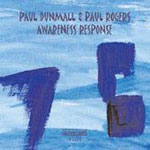PAUL DUNMALL & PAUL ROGERS : Awareness Response (Emanem 4101)
ELTON DEAN : Sea Of Infinity (Hux Records. HUX050)

I saw Dunmall and Rogers some time ago as part of a trio with a guitarist. Unfortunately their combined musical personalities overshadowed the third member and what I chiefly recall is the phenomenal power and empathy that was created by the duo. This cd will give you some idea of what they were like that evening, this time from a studio performance captured last year.
This trio of improvisations features Dunmall on three of his chosen instruments, bagpipes, tenor and soprano sax, while Rogers plays the custom-built A.L.L. bass, a six-string version which also incorporates a dozen sympathetic strings giving it a fairly distinctive sound and range. First, to dispel any misconceptions about bagpipes, Dunmall’s are Border pipes, from the south of Scotland, and have a slightly softer tone than the traditional Scottish variety, though in Dunmall’s hands their sound is frequently transformed into something not entirely recognisable but wild and untameable.
The pipes are employed on the first track, ‘Pressure Response’ where they pour forth a torrent of sound that is, at times, close to that of a furiously bowed bass. Rogers keeps pace utilising strumming, pizzicato and arco techniques. The two players often mesh into a dense unstoppable whirlpool where their voices mesh as one, emphasising the kind of togetherness they have honed and perfected. There is also a more reflective passage, towards the conclusion, where Dunmall sets up a drone against which Rogers draws plangent, elegiac responses as well as darker tones reminiscent of the cello’s range. It is a bold excursion that combines some of their interests in folk musics and free improvisation whilst exploring the combined tonal possibilities of these instruments.
Their tenor/bass improvisation sounds a little more restrained than I’d expected, as though they are holding something in reserve and displaying another kind of dynamic, which is fine by me. I was just preparing myself for a tree-levelling blast from the sax when what manifests is something more lyrical, though still charged with a tense, edgy atmosphere much of the time. Instead of the onslaught presented in the previous track they tend to break this piece down into busy sets of unison explorations, allowing a certain amount of space to enter into their dialogues. Again, the empathy is uncanny.
‘Precious Response’, the final track, pitches the fluttering lightness of the soprano against the grainy bowed bass to exceptional effect. Whilst Dunmall flits between calm and agitation, bending and sustaining notes, Rogers creates a writhing undertow of circular rhythms and angular bowing that contrasts and complements. They move comfortably between the pensive and the more vigorous, each constantly reacting with split-second timing to the other.
As an example of how this duo work it is exemplary, demonstrating the wealth of approaches and ideas present in their playing. The only way it can be bettered is by seeing them do it live.

This cd finds Dean in a three different settings; in duo with Hewins, as a trio with the guitarist alongside poet/vocalist Sybil Madrigal and finally basking in the emergence of another EDQ, the quartet format Dean has been using for many years. This , for me, is the force that drives this particular recording. Comprising Hewins (digital guitar), Marcio Mattos (acoustic bass) and Tony Bianco (drums), it is one of the most powerful quartets Dean has found himself in and is partially reminiscent of the turbulence stirred up when he played alongside drummer Phil Howard several decades ago.
Their opening track is a long, raw edged improvisation where Dean slow burns at first on alto, eschewing more melodic forays then pitting his terse exhortations against the maelstrom kicked up by Bianco and Mattos’ urgent bass. Hewins’ guitar swoops across it all creating acidic waves that sometimes leave faint traces of melody or scrubbed chords that provide perfect counterpoint to the acoustic instruments. It is dense, orgiastic improvisation that finds all members shifting in and out of the foreground and still remaining a taut collective entity.
The second piece, ‘Beer Can and X’ doesn’t quite scale the same stratospheric energy levels at first but soon becomes full of probing, flexing bass and more dizzying drumming. Dean’s playing, on alto and saxello, straddles the ground between compressed swathes of melody and raucous wailing. Hewins is sometimes low-key, shimmering behind Mattos’ strummed attack or sailing off, sharp and clear, into the ether. Once more it is a passionate collective effort that, in Dean’s own words, shows this band to be ‘a very powerful force’.
His work with Hewins has a long history and this outing reflects their ability to read each other easily. The acoustics of the recording location immediately contribute to Dean’s sound, it is more spacey and this, in turn, is reflected in the playing as he bounces ideas off Hewins’ delicate, celeste-like notations. The sax remains robust while the guitar sketches a limpid backdrop, taking in a little of ‘Goodbye Pork Pie Hat’ along the way. Within the context of the cd it is an apt contrast and gives the listener breathing space between the quartet’s torrid expositions.
Finally, I must confess that I am always wary of poetry/jazz collaborations. Why doesn’t the poetry just stand up and declare itself, naked and shivering, without the jazz shield ? Anyway, I wasn’t brimful of expectation when I saw one track with poet/vocals and the name did nothing to reassure me. Maybe it was a send-up. I hope it wasn’t serious but performed for a laugh in a crapulous couple of minutes. I’m still not sure why it was included but it does nothing to detract from the rest of the cd which, like the Dunmall/Rogers album, stands as proof that heart-felt and invigorating music, whether you call it free jazz, free improvisation, spontaneous composition, is alive and kicking.
© 2004 Paul Donnelly